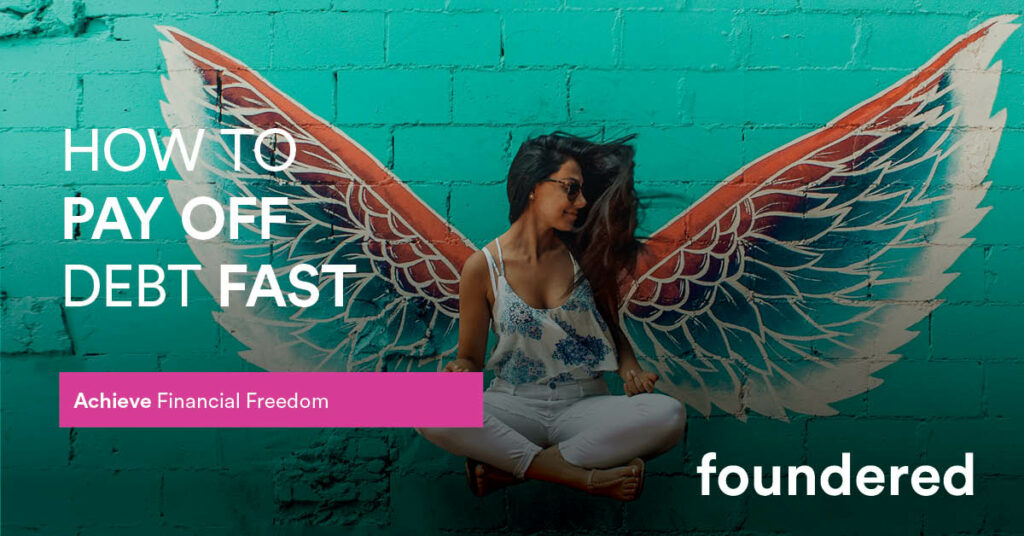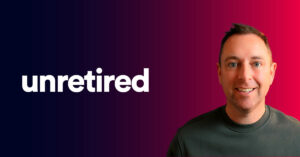Many of my readers are looking to pay off debt on their path towards financial independence. I know this, because you’ve told me so. While our collective goal is financial freedom, we are each at our own part of the journey and travelling at our own pace. And that’s just fine!
While some of us are looking to pay off debt, others are planning their first investment. Let this be a reminder that this is your journey, so stop comparing yourself to others. Run your own race as they say!
Left unattended debt can spiral out of control and will work against our goal of financial independence. So, if you want to get out of and stay out of debt, this article will help! We’ll explain what the different types of debt are and what strategies you can use to pay off debt fast.
Is all debt bad?
While not all debt is bad, the majority of debt works against us and will make you tread water on your FI journey. I’ve only had debt for a short period in my life (you can read about that here) and it can cause worry, stress and negatively affect your mental and physical well-being. I wouldn’t recommend it!

What are the different types of debt?
There are many forms of debt that you will be familiar with, such as loans, credit cards, store credit or taxes. Recently with the launch of providers such as Klarna, point-of-sale loans have become widespread across the UK and are growing at a fast pace.
Debt can come in many forms, but it can be categorised in two main types of debt: secured debt and unsecured debt.
What is secured debt?
Secured debt is when you borrow money against an asset such as a property or vehicle. For example, when you get a mortgage, this is secured against the house you purchase. If you can’t repay your debt, the lender has the right to repossess the asset and sell it to pay off your debt. The same is also true with a vehicle loan.
The interest rates on secured debt are often much lower than other types of debt. This is primarily due to the security the lender has with asset you have purchased. The consequences for not honouring your loan agreement are often much greater with secured debt due to the loan value.
What is unsecured debt?
Unsecured debts, such as personal loans, overdrafts or credit card debt, are not taken out against an asset. Instead you will most likely be charged a higher interest rate to cover the lenders risk.
If you don’t repay on time or in full, the creditor can’t repossess the items you bought with the loan, but they will try to recover the debt. Failure to do so may result in damage to your credit score, limiting your ability to borrow in the future, among other things.
What are the best ways to pay off debt?
Before we look at the ways to pay off debt, you should make a list of all your debts. Understanding how much debt you have and the details around the loans are critical to paying off your debt using the methods below.
For each debt you have, detail the following information
- Debt Name / Account:
- Type of debt:
- Balance:
- Interest Rate:
- Payment Terms
- Minimum Monthly Payment:
Want to achieve financial independence?
You could spend the next 13 years learning about personal finance and putting your knowledge into action. Or you could take my FREE 10 day mini course and weekly emails. I’ll show you exactly how to become financially independent. My only question is, whats stopping you?
How do I prioritise paying off my debts?
In general there are 3 effective ways to prioritise and pay off debt. The snowball method, the avalanche method and debt consolidation. Each have their merits.
While some are more effective than others from a financial sense, paying down debt is also a mindset challenge. Choosing the method that suits your circumstances best and that you can stick to, is the one to follow.
The snowball method
When choosing to pay off debt using the snowball method, you pick the loan with the smallest balance remaining and overpay on that loan to clear it as quickly as possible.
Once you close that debt, any money you would have put to that loan gets put towards the next smallest debt owed. You continue this process until you have paid off all of your debts. Just like a snowball rolling down a hill, your payments towards your next largest debt will grow as each debt is cleared.
The snowball method allows you to celebrate increasingly larger and frequent wins as you pay down each debt. Many find this helps them stick to their debt repayments.
The avalanche method
The avalanche method takes a different viewpoint. Instead of the smallest balance, it focuses on the loans with the highest interest rate first, regardless of balance remaining.
Once the debt with the largest interest rate is cleared, any money you would have been putting towards the first loan, goes into the next highest interest rate loan. This process is repeated until all loans are paid off.
With the avalanche method, it may feel like you aren’t progressing quickly in the early stages as the first loans may take longer to pay down. However, you should ultimately pay less interest on your loans as you are tackling the higher interest debts first. In the early stages
Debt consolidation
A debt consolidation loan is a type of loan that’s used to combine all your existing debts into a singular one. This means you would be paying the balance of your loans to one company and may make the admin of this much more manageable.
You may find that with consolidation loans, that the interest rate is lower than what you are currently paying. In certain instances, debt consolidation companies can negotiate with your current loan providers on unaffordable debt when moving to their services.
It is wise to note that you are setting up a new loan with new terms and this may result in you paying more for your loan over the length of the loan.
Top Tip: You will pay less interest on your debts, if you pay them off using the avalanche method.
Is it better to pay off debt or save money?
Generally speaking it is better to pay off debt first and then focus on your savings. While, both are important, the interest you are being charged on your unsecured debts, is usually larger than the interest you could earn on your savings, so it make sense to pay these down first.
Due to the terms and conditions of secured debts such as car loans, it may not make sense to pay this off earlier than the agreed terms.
Good debts such as mortgages slightly complicate the matter. However if your only debt is an affordable mortgage, you’re in a better position than many.
What is good debt?
“Good” debt is defined as money owed for things that can help build wealth such as mortgages. It’s important to distinguish, that even good debt is still debt and failure to pay can lead to other financial difficulties.
When deciding if you should pay off your good debt such as a mortgage, compare the interest rate you are paying against the expected returns if you invest that money. From a financial viewpoint it often makes sense to keep the mortgage payment as standard and to invest the money elsewhere.
With that said, the emotional and phycological benefits of having paid off your mortgage cannot be overlooked.
5 tips for paying off debt fast
1. Create a budget
Tracking your income and expenses in a budget is the cornerstone of paying off your debt.
Try using a spreadsheet and update it regularly to get a clear understanding of where your money is coming from and is going. By managing and reducing your outgoings, you can put more of the money you already earn to your debt repayments.
2. Increase your income
One of the most effective ways to pay off debt, is to overpay on each of the loans. With your current income and expenses this may not be possible. Consider taking on a second job or starting a side hustle to increase your income and put this additional income towards your loans or debt.
You may also find that working more, you remove the temptation to spend further while paying down the balances. Remember it’s not forever, just until you pay off your debt.
3. Don’t get in more debt
Debt is actively working against you and when you are in debt, it is easy to incur more debt. Cut up those credit cards and avoid this by paying in cash. When paying in cash you gain control over your spending as you can see it disappear as you spend it.
4. Switch credit card debt to 0% with a balance transfer
A balance transfer card can allow you to switch debt from one credit card to another where you can avail of an introductory interest free period.
There is often a charge for the balance transfer, so this might not be the most cost effective, but it is definitely worth checking out in your instance and doing the maths to see if you can save anything on your loan interest.
5. Remove online temptation
If you’re looking to pay off debt, you should pause any non-essential spending. This means you most likely don’t need that new outfit and you certainly don’t need a meal from that new fancy avocado toast take-away…
Common advice is that you remove your credit and debit cards from all stores and apps that you normally make purchases from. This way you have the opportunity to make a decision whether or not you want to make the purchase.
I suggest going one step further by removing the apps entirely or blocking the websites and so removing temptation.
Does being in debt affect my credit score?
Carrying a lot of debt, especially large unsecured debts such as credit card debt, can impact your credit score. The lower your credit score, the harder it will be for you get approved for new loans.
A low credit score can definitely cause mortgage applications to be denied or the amount available, lowered significantly. If you are planning to get a mortgage, it is prudent to clear down your debts more than 3 months before you make your mortgage application.
Need help with debt?
If you are concerned with your debt, there are some go to services that can provide information and support. Many of these are charities and provide unbiased, non-judgemental advice. If you need help, act now!
- Citizens Advice – https://www.citizensadvice.org.uk/
- Step Change – https://www.stepchange.org/
- National Debtline – https://nationaldebtline.org/
The fastest method to pay off debt is the avalanche method. Where you pay off debts with the highest interest rate first.
Debt consolidation is a form of debt management. You consolidate all your loans with one provider and they provide you with a loan to pay off all others. Debt consolidation will not affect your credit score, if you keep up with your payments.
Generally speaking you are in a better financial position for paying off all debt. However debt such as a mortgage, is considered good debt as it increases wealth of the holder over time.
- Don’t get into any new debts
- Understand how much you owe
- Create a budget and cut spending
- Find ways to increase your income
- Pay down your debts using the the debt snowball, debt avalanche or debt consolidation methods
- Repeat until you have paid off all your debts.

